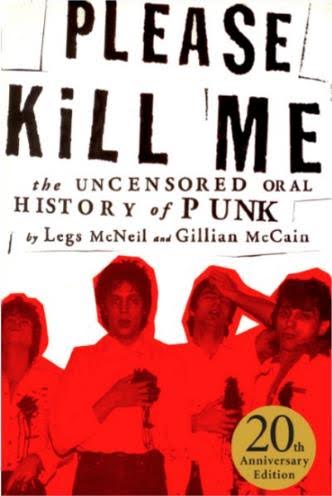Please Kill Me. An Interview with Gillian McCain
 What is it about the book, Please Kill Me, by Legs McNeil and Gillian McCain, that has enabled it to stand the test of time? Originally published in 1996 and now celebrating its 20th year with a new, expanded edition, this chronicle of the birth and death of punk rock feels just as raw and raucously entertaining as ever and a necessary tonic to today’s more self-conscious, PR-driven protectionism. In the era of debate between free speech provocateurs and hate speech accusers, Please Kill Me is a bracing slap in the face, or more like a kick in the nuts, bringing you back to the simplicity of an era that for all its decadence and decay, now retains a kind of hard won innocence. While punk rock was definitely not the most racially diverse or gender-sensitive movement, the music was and is still indelible, classic, indispensable. It’s a true guilty pleasure to go back and read the verbatim dialogue, as 1970s luminaries happily incriminate themselves and others, seemingly without any regard for hurt feelings or career repercussions. The list of contributors is long: Iggy Pop, Jim Carroll, Dee Dee Ramone, Richard Hell, as well as dozens of other musicians, poets, groupies, junkies, strippers and sycophants. Please Kill Me brings the punk era to life in this oral history, the greatest rock and roll book of all time.
What is it about the book, Please Kill Me, by Legs McNeil and Gillian McCain, that has enabled it to stand the test of time? Originally published in 1996 and now celebrating its 20th year with a new, expanded edition, this chronicle of the birth and death of punk rock feels just as raw and raucously entertaining as ever and a necessary tonic to today’s more self-conscious, PR-driven protectionism. In the era of debate between free speech provocateurs and hate speech accusers, Please Kill Me is a bracing slap in the face, or more like a kick in the nuts, bringing you back to the simplicity of an era that for all its decadence and decay, now retains a kind of hard won innocence. While punk rock was definitely not the most racially diverse or gender-sensitive movement, the music was and is still indelible, classic, indispensable. It’s a true guilty pleasure to go back and read the verbatim dialogue, as 1970s luminaries happily incriminate themselves and others, seemingly without any regard for hurt feelings or career repercussions. The list of contributors is long: Iggy Pop, Jim Carroll, Dee Dee Ramone, Richard Hell, as well as dozens of other musicians, poets, groupies, junkies, strippers and sycophants. Please Kill Me brings the punk era to life in this oral history, the greatest rock and roll book of all time.
What was your initial inspiration to create the book using the oral history method?
Legs started working on an official autobiography of Dee Dee Ramone and had convinced Dee Dee to do it in the oral history format because Legs and I were both total fans of the book, Edie, that came out in the 80s. We just couldn’t understand why more people didn’t use that form. Obviously in an oral history he has to interview the people around Dee Dee so we started with Danny Fields. Legs was getting it transcribed and putting it in binders and I was getting up early for work and highlighting stuff and there was so much great stuff that wasn’t about The Ramones and I had said to him earlier “It’s just a bigger story. Why hasn’t anyone done the oral history of punk?†And so then Dee Dee got a bit hard to get along with and Legs said “Yeah it is a bigger story, let’s do the oral history of punk. Wanna do it with me?â€
Had you ever collaborated before then?
We might’ve tried to write a screenplay and got 10 pages into it.
The idea of collection: antiques collecting, collecting voices, dialogue, sound, do you have any sense of why that appeals to you, are there other things you collect? Do you have a collector’s mentality?
I guess I’ve thought of our archives that way, which is based on these tapes and transcriptions. I collect mainly found photography. I’ve got thousands of those, I’ve been collecting them for 20 years. For me it’s a history collection. Someone dies off their story dies off and I want the story to stay alive.
Can you describe what your methods are for making order out of the chaos of such a sprawling collection?
It’s really hard. Legs does all the structure, we talk all the time about where it’s going, we go into the book with just a tiny preconceived notion or mission statement and then of course, usually you learn the story as you go along. So he’s doing the structure and I’m reading it as he goes along, giving him feedback, I’m trying to find stuff from old interviews, because sometimes we’ve done them years ago and we’ve forgotten and also this is pre-internet, so we’re printing them all out. I was doing the yellow highlighter “Oh you should put this here,†he’d give it to me back to read and he’d say “I think I got it,†and I’d go “No you don’t have it†and he’d be really mad and then I’d suggest some changes and then he’d know I was right and so it’s just real collaboration, just back and forth. He could probably do it without me, but I couldn’t do it without him. What he does with the structure is so hard.
Was there anyone from the punk rock era you felt never quite got their due?
Maybe Bob Quine. He was a brilliant guitar player. I think part of the thing was he didn’t look the part. He just looked like he could’ve been a professor or an insurance salesman.
Have you seen any of the recent attempts to fictionalize the punk rock era like the CBGB’s movie or Martin Scorsese’s Vinyl?
Well it was interesting, I really hated Vinyl. And then we did a reading in LA and there was a question and answer and Clem Burke, Blondie’s drummer, was in the audience and they were like what did you think of Vinyl and Legs hadn’t really seen it and I was like “I hated it†and then Clem said from the audience “Can I say something?†he goes “I really liked it because it brought the music into the living rooms of America that they never would’ve heard before.†So if you look at it that way…
…performing a service even if it was in a completely over the top way?
It was fucking terrible and also obviously our book was used as such a text for it.
What’s new in this 20th edition?
There’s new photos, there’s a new interview by James Williamson from The Stooges. Legs and I did an essay on the narrative oral history about our techniques and how we do it.
One of the things I learned from the book and was surprised by is that a lot of these figures were in their late twenties, early thirties before they had any real notoriety, as opposed to today when you’re over the hill at 21.
You know it’s interesting, I think even once she started hanging out, Debbie Harry must’ve been 30. Patti was a little bit older than the rest. I always think embracing all ages is a very positive thing.
These people made such fully formed records. Their first records, the first Television record, the first Patti Smith record. They were old enough to have lived a degree of a life to be able to make a statement like that whereas you can’t really have that perspective if you’re just a teenager.
Yeah, yeah. True enough.
Do you have any feelings about the ubiquity of the word “punk� People describing something as “so punk rock�
No. People in the book might be bothered that my name’s connected to punk. I wasn’t there. I kind of like it. I like that it’s so long ago but still, if you’re in high school and you’re a punk, you’re still the outsider. It’s kind of neat.
Do you think CBGB’s should have been saved somehow, turned into a landmark or a museum or is it basically just survival of the fittest in New York City and once a business can’t pay its rent then it’s over?
I just can’t believe the city didn’t come in and help with the rent or something. It was such an institution. It was just a sin.
Any damaging Donald Trump anecdotes lying around from the 70s or 80s that we can use to bring down his presidency?
It’s just so funny. He was never liked. That’s why I just find it so weird. To people of middle America, I would think he would’ve been the quintessential New Yorker and why they hated New York. His name is so connected to the city and everyone hates him.
For more information on PLEASE KILL ME: The Uncensored Oral History of Punk 20th Anniversary Edition by Legs McNeil and Gillian McCain, please visit AMAZON.


